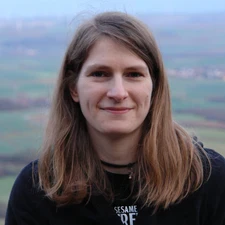Rebekka Steffen

G Geodesy
The 2023 Division Outstanding Early Career Scientist Award is awarded to Rebekka Steffen for her outstanding interdisciplinary contributions on the interface of geodesy and tectonophysics.
The research work of Rebekka Steffen has demonstrated both substantial breadth and a keen multi-disciplinarian perspective in geodesy and tectonophysics. Her main area of research is the modeling of glacial isostatic adjustment processes with a focus on stress field changes. Furthermore, she is an active contributor to EUREF, the Regional Reference Frame Sub-Commission of the International Association of Geodesy for Europe, and has in this role been involved in the development of a European velocity model. In this context, her latest important contribution to geodesy is the implementation of an extended collocation method based on moving variance for the generation of velocity field models. This method is the base for the coming high-resolution EUREF velocity field model for Europe and updates currently used strain rate products. Using data of the satellite gravity missions CHAMP, GRACE, and GOCE she created high-resolution 3-D maps of the Moho underneath the Tien Shan as well as Greenland. She also contributed to other gravity studies in the African Rift, Botswana and the Moon. In tectonophysics, Rebekka Steffen investigated crustal stresses in northern Canada, derived from moment tensor analysis. One of her outstanding contribution is the development of a novel computational method for fault slip induced by the last glacial cycle. She contributed to our understanding of the effect of fault slip magnitude and stress release at a palaeo-seismic event on long aftershock sequences along the Osning Thrust. In these studies, she demonstrated her expert proficiency for integrating datasets from various geoscience subdisciplines. Recently, she has contributed to the computation of the tsunamigenic potential of a retreating Greenland ice sheet.
Finally, Rebekka’s community-building activities in the geodetic, palaeo-sea-level and lithospheric communities are outstanding. Not only has she been serving as the EGU Geodesy Division’s Early Career Scientist (Co-)Representative since 2021, but she has also been actively involved in the International Association of Geodesy by leading the Joint Study Group 3.1 “Geodetic, Seismic and Geodynamic Constraints on Glacial Isostatic Adjustment”. She has been an invaluable driving force behind the now very active EGU Geodesy Division blog by attracting, managing and editing contributions. Furthermore, she attracts students for geodesy in outreach activities such as Native Scientist Project manager for German in Sweden and has been very active in international scientific meetings (e.g. EGU, AGU, IAG) as co-convenor and judge.
